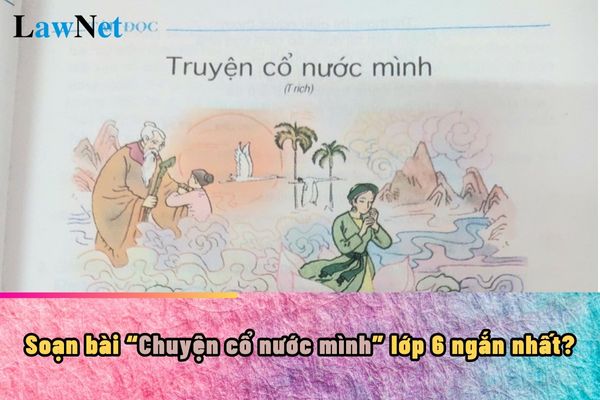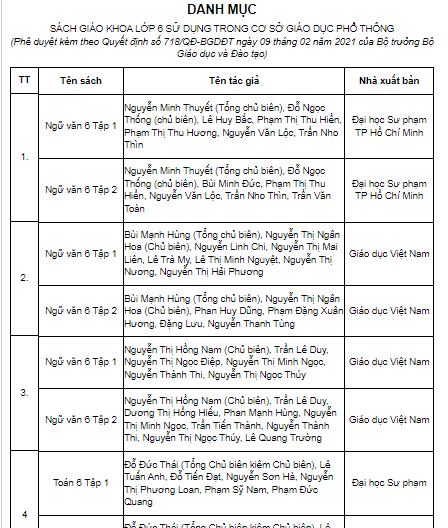What are guidelines on preparing the lesson "Chuyện cổ nước mình" for grade 6 students in Vietnam? What are on the List of textbooks required for the 2024-2025 school year in Vietnam?
What are guidelines on preparing the lesson "Chuyện cổ nước mình" for grade 6 students in Vietnam?
"Chuyện cổ nước mình" is one of the contents that students will learn in the grade 6 Literature program.
Students can refer to the following guidelines on preparing the lesson "Chuyện cổ nước mình" for grade 6 students:
|
Analysis of the poem " Chuyện cổ nước mình " by Lâm Thị Mỹ Dạ The beauty of the soul in each poetic line |
*Note: The information about the preparation for "Chuyện cổ nước mình" for grade 6 students in Vietnam is for reference only./.

What are guidelines on preparing the lesson "Chuyện cổ nước mình" for grade 6 students in Vietnam? What are on the List of textbooks required for the 2024-2025 school year in Vietnam? (Image from the Internet)
What are on the List of textbooks required for the 2024-2025 school year in Vietnam?
Based on the List of Grade 6 textbooks used in general education institutions issued according to Decision 718/QD-BGDDT in 2021:

>>> Download List of Grade 6 Literature textbooks needed for the academic year 2024-2025.
What are criteria for the textbook contents in Vietnam?
According to the regulations in Article 5 of the Regulation on standards, the process of compiling, revising textbooks, the standards for organizations, individuals compiling textbooks; organization and operation of the National Council for textbook evaluation issued with Circular 33/2017/TT-BGDĐT, the content of textbooks must ensure the following criteria:
- The content of the textbook accurately and fully represents the content of the subject or educational activity program.
- Ensure basic, scientific, practical nature, suitable to the realities of Vietnam.
- Terms, concepts, definitions, data, events, images must be accurate, objective, consistent, and appropriate to the students' level.
- Data, events, images must have clear origins.
- New scientific achievements related to the subject program, educational activities must be updated, meeting international integration requirements and suitable with the goals of the educational program.
- Educational content about national sovereignty, human rights, children's rights, gender equality, sustainable development, environmental protection, adapting to climate change must be appropriately represented.
Furthermore, the principle of textbook compilation must adhere to Article 3 of the Regulation on standards, the process of compiling, revising textbooks, the standards for organizations, individuals compiling textbooks; organization and operation of the National Council for textbook evaluation issued with Circular 33/2017/TT-BGDĐT, as follows:
[1] In alignment with the perspectives and policies of the Communist Party of Vietnam; complying with the Constitution and laws of Vietnam.
[2] Transform the goals, contents, methods of education, and evaluation of the educational program outcomes; ensure coherence across educational levels, grades, subjects, and educational activities.
[3] Linked to Vietnam's specific conditions and in line with advanced global educational trends, ensuring the best interest of learners.
Additionally, according to Article 5 of the Regulation on standards, the process of compiling, revising textbooks, the standards for organizations, individuals compiling textbooks; organization and operation of the National Council for textbook evaluation issued with Circular 33/2017/TT-BGDĐT, the content of textbooks must be guaranteed as follows:
- The content of textbooks must correctly and fully depict the subject program or educational activity; ensuring basic, scientific, practical, and suitable for the realities of Vietnam.
- Terms, concepts, definitions, data, events, and images must be accurate, objective, consistent, and appropriate to the students' levels; data, events, and images must have clear sources.
- New scientific achievements related to the subject program, educational activities must be updated, meeting international integration requirements and suitable with the goals of the educational program.
- Educational contents about national sovereignty, human rights, children's rights, gender equality, sustainable development, environmental protection, adapting to climate change must be represented appropriately.

